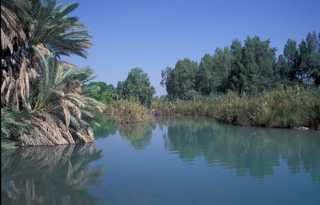 Switching to sustainable urban water management
Switching to sustainable urban water management
Cities around the world are facing a myriad of pressures, including rapid urbanisation and urban sprawl. As a result, authorities are finding it increasingly difficult to manage scarce water resources, deliver water and sanitation services, and dispose of wastewater. At the same time, authorities must do their utmost to minimise the negative impact of such developments on the environment and urban populations.
The SWITCH project proposes a global shift in urban water management for the City of the Future. The project is a partnership between the European Union and a consortium of 32 world wide partners led by UNESCO-IHE and was presented at the 4th World Water Forum in Mexico City on 19 March 2006. It has a budget of 22 million Euros, mainly funded by the European Union within its efforts to promote efficient water use and integrated water management to address water-related Global Change pressures. These pressures include population growth, urbanization and climate-change.
The SWITCH project, which began in February 2006 and lasted for 63 months, challenged existing paradigms by finding and promoting more sustainable alternatives to conventional means of managing urban water. SWITCH project team also carried out action-oriented research in cities that reflected the expressed needs of residents.
With UNESCO-IHE Institute for Water Education (UNESCO-IHE) as lead partner, SWITCH comprised a consortium of 33 organisations working in 15 European and developing cities across the globe.
“The consortium worked hard to share knowledge and research on a wide range of tested scientific, technological and socio-economic solutions to urban water management,” said SWITCH project representative Peter van der Steen. “Such solutions are being adopted globally to replace the many different ad-hoc approaches which currently exist and to create sustainable urban water management in the “City of the Future”.
“Learning Alliances” which brought key stakeholders together to create win-win solutions across the water chain, were according to van der Steen, “a core feature of SWITCH”. Other important themes included “Action Research” which saw users addressing problems through innovation; “Multiple Learning” which enabled cities to learn from each other’s experiences and a “Multiple Level Approach” that considered the urban water system at various levels. Finally, renowned experts were heavily involved in the project, bringing essential scientific, technological and financial resources to the programme.
On 18th September 2012, the SWITCH consortium was honoured with the International Water Association's (IWA) Sustainability Award 2012 for “innovation in the practical realisation of sustainable urban water management” at a ceremony in Busan, Korea. According to the IWA, the impressive achievement of the SWITCH project was its demand-led learning Alliances: the notion that what the people want is at the cutting edge of what gets to be done to achieve water-sensitive cities.
In addition to winning awards, SWITCH has influenced water policy, deployed a comprehensive training package in use by Local Governments for Sustainability (ICLEI) and UNESCO-IHE, and produced multiple manuals, guidelines and analysis tools.
With nearly €15 million of funding under the Sixth Research Framework Programme (FP6), the SWITCH approach of integrating water management at the city level, through learning alliances, research, demonstrations and training, has been taken up by the World Bank and others.
Project details
- Project acronym: SWITCH
- Participants: The Netherlands (Coordinator), United Kingdom, Germany, Greece, Israel, Poland, Sri Lanka, Colombia, Peru, Egypt, Spain, Ghana, China, Brazil, Switzerland, West Bank and Gaza Strip
- FP6 Project N° 18530
- Total costs: €21 282 790
- EU contribution: €14 749 996
- Duration: February 2006 - April 2011
Project details
Project reference: 18530Status: Completed
Total cost: EUR 21 282 790
EU contribution: EUR 14 749 996
Programme acronym:
FP6-SUSTDEV
Contract type:
Integrated Project
| Project number | 18530 | ||
|---|---|---|---|
| Subject(s) | no translation available , no translation available , no translation available , no translation available | ||
| Acronym | SWITCH | ||
| Geographical coverage | Netherlands , United Kingdom, Germany, Greece, Israel, Poland, Sri Lanka, Colombia, Peru, Egypt, Spain, Ghana, China, Brazil, Switzerland, Palestine | ||
| Budget (in €) | 21282790 | ||
| Programme | EU-FP6 | ||
| Web site | http://www.switchurbanwater.eu/ | ||
| Objectives | With increasing global change pressures, and due to existing limitations, and un-sustainability factors and risks of conventional urban water management (UWM), cities experience difficulties in efficiently managing the ever scarcer water resources, their uses/services, and their after-use disposal, without creating environmental, social and/or economic damage. - The project will develop scientific, technological and socio-economic solutions that contribute to effective urban water management schemes. It deals with challenges related to the quantity and quality of water, ineffective sanitation systems, poor governance and costly water management. The implementation of the results of SWITCH is expected to shape the City of the Future by 2050. - Using a very innovative approach, SWITCH is designed to cover all elements of the urban water cycle, from water demand management, to storm water management, waste prevention, treatment and reuse, governance and asset management, to river rehabilitation and eco-hydrology. - It will integrate three activities: Research, Training and Demonstration, carried out by all partners. Learning Alliances will be set up to ensure smooth exchange of knowledge and experiences between these activity clusters, and between the Demonstration cities |
||
| Results | |||
| Period | [01/02/2006 - 30/04/2011] | ||
 you are not logged in
you are not logged in





